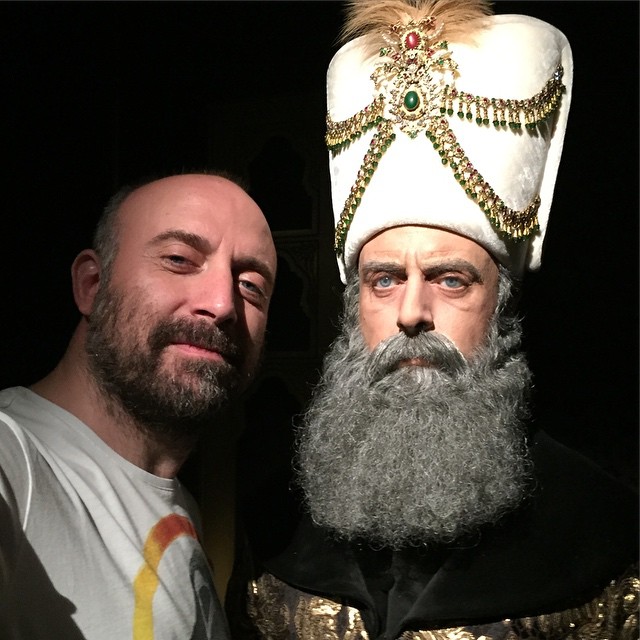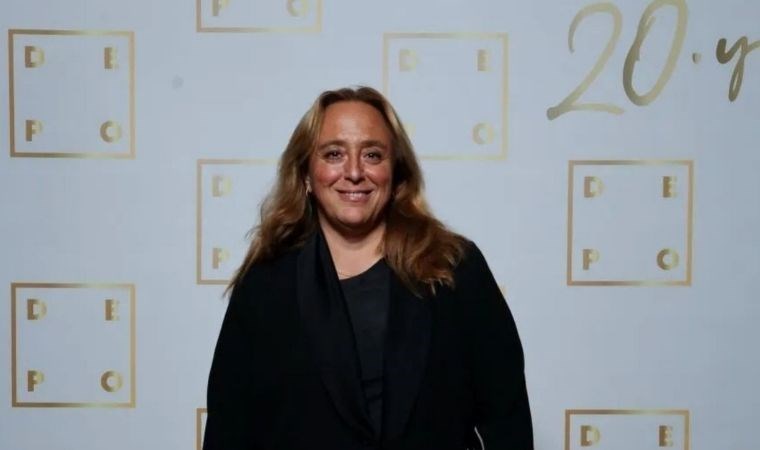$5M fake romances, blacklisting: Türkiye’s cartel-like entertainment industry
 Ayse Barim, Serenay Sarikaya, and Mert Demir are at the center of allegations involving a fabricated romance reportedly orchestrated for $5 million, sparking major controversy in Türkiye’s entertainment industry, Jan 13, 2024. (Photo collage by Türkiye Today)
Ayse Barim, Serenay Sarikaya, and Mert Demir are at the center of allegations involving a fabricated romance reportedly orchestrated for $5 million, sparking major controversy in Türkiye’s entertainment industry, Jan 13, 2024. (Photo collage by Türkiye Today)
Türkiye’s entertainment industry is embroiled in a heated controversy, with allegations of monopolistic practices by talent management agencies sparking widespread debate.
At the heart of this issue is Ayse Barim, founder of ID Communication (ID Iletisim), one of the country’s leading management companies. Even though Barim and her agency have denied the claims, the controversy has drawn attention to deeper systemic issues within the industry.
Months before the current uproar, journalist Fuat Ugur had brought forward claims of monopolistic practices within the entertainment industry, focusing on talent agencies and casting companies. His articles described systemic issues, such as the exclusion of independent talent and manipulative tactics, which are now being widely discussed.

Investigations into alleged monopolization within entertainment industry
The Turkish Competition Authority (Rekabet Kurulu) has launched a formal investigation into 21 management agencies and casting companies following numerous complaints about monopolization and unfair practices.
These allegations seem to be rooted in years of dissatisfaction within the industry and claim that a few powerful agencies have created a stranglehold on the acting profession, sidelining those who refuse to comply with their demands.
The investigation involves the seizure of financial records, contracts and communications. According to reports, the agencies are accused of manipulating the industry by forcing producers to cast specific actors or by requiring additional hires from their rosters.
The Istanbul Chief Prosecutor’s Office has imposed a travel ban on Ayse Barim, citing concerns that she might attempt to leave the country. Financial audits are underway, focusing on allegations of tax evasion, money laundering, and other financial irregularities.

Key allegations against leading Turkish management company ID Communication
ID Communication, under the leadership of Ayse Barim, has become the focal point of these allegations. Multiple actors and producers have come forward, sharing accounts of their experiences with the agency’s alleged practices. Key claims include:
- Favoritism in casting: Barim is accused of leveraging her influence to control casting decisions, with reports suggesting that producers are pressured into hiring actors from her roster. In some cases, they were required to hire additional actors from her agency to secure high-profile talent.
- Fabricated publicity stunts: Allegations have emerged that Barim orchestrated a fabricated relationship between actress Serenay Sarikaya and singer Mert Demir, allegedly receiving $5 million from a businessman to create a false romantic narrative. This claim has led to heightened scrutiny of the agency’s methods.
- Blacklisting and exclusion: Actors who refused to comply with Barim’s terms have allegedly faced blacklisting, making it nearly impossible for them to find work within the industry.
ID Communication represents a large roster of prominent actors in Türkiye, such as:
- Serenay Sarikaya
- Hande Ercel
- Asli Enver
- Fahriye Evcen
- Halit Ergenc
- Hazal Kaya
- Sukran Ovali
- Sukru Ozyildiz
- Zafer Algoz
- Nejat Isler
- Okan Yalabik
- Pinar Deniz
- Ibrahim Selim
- Mehmet Gunsur
- Mert Yazicioglu
- Merve Dizdar
- Metin Akdulger
- Miray Daner
- Ekin Koc
- Esra Bilgic
- Ezgi Mola
- Caner Cindoruk
- Devrim Ozkan
- Dolunay Soysert
- Selma Ergec
- Serkan Altunorak
- Sinem Kobal
- Bige Onal
- Birce Akalay
- Birkan Sokullu
ID Communication and several actors managed by the agency have denied these accusations, describing them as “baseless and immoral.” The agency has stated its intention to pursue legal action against those spreading these allegations.

Divided responses from the Türkiye’s entertainment industry
The controversy has exposed deep divides within Türkiye’s entertainment industry. Prominent figures have taken sides, either defending or condemning the accused agencies:
- Support for Ayse Barim: Prominent actors such as Hazal Kaya and Berguzar Korel have publicly defended Barim, arguing that the accusations are part of a broader effort to undermine successful women in the industry. Kaya remarked, “You cannot punish women for being talented, beautiful and living life as they wish.”
- Voices of criticism: Actors like Sedef Sahin, Deniz Isin, and others have spoken out about their struggles in the industry, accusing agencies of favoritism and unethical practices. Sedef Sahin revealed that she turned to theater after being pushed out of television roles due to what she described as a “closed-door system.”
- Public advocacy: Other industry figures, such as Farah Zeynep Abdullah and Melisa Sozen, have called for systemic reform. Abdullah emphasized the importance of addressing the root causes of monopolization, stating, “The issue isn’t just about one agency—it’s about an entire system that needs to change.”
Social media has played a significant role in amplifying these discussions. Viral posts have reignited public debate, drawing millions of views and sparking widespread discussion about the industry’s practices.

Systemic issues in Türkiye’s acting industry
While the allegations against ID Communication are significant, they reflect broader systemic problems that have plagued Türkiye’s entertainment industry for years:
- Exclusion of independent talent: Many actors and producers claim that monopolistic practices have created insurmountable barriers for newcomers. These practices allegedly prioritize established connections and financial arrangements over talent and merit.
- Coercive contracts: Reports of “slave contracts” have emerged, with actors describing agreements that severely restrict their creative and professional freedoms.
- Fabrication and manipulation: Claims of fabricated relationships and manipulated casting decisions signal the unethical practices some agencies are accused of employing to maintain control.
- Harassment and exploitation: Stories of harassment, coercion, and exploitation have surfaced, with some actors alleging they were pressured into unethical compromises to secure roles.
- Stifling creativity: Critics argue that the dominance of a few agencies has led to repetitive casting choices and a lack of diversity in productions, ultimately harming the industry’s creativity and appeal.

Turkish Competition Authority’s legal and regulatory actions
Authorities are taking steps to address these systemic issues. The Turkish Competition Authority’s investigation aims to determine whether the accused agencies violated laws governing competition and market fairness.
Simultaneously, the Istanbul Chief Prosecutor’s Office is examining financial and ethical misconduct within the industry.
Key actions include:
- Financial audits: Agencies under investigation are required to provide detailed financial records, including contracts and payments. This aims to uncover potential instances of tax evasion and other financial crimes.
- Legal repercussions: Agencies found guilty of monopolistic practices could face significant fines and legal penalties. Individuals involved may also face criminal charges.
- Reforms in oversight: The investigations are expected to prompt recommendations for greater transparency and accountability within the entertainment sector.

Cultural and social implications
The allegations have brought forward the broader cultural and social impacts of monopolistic practices in Türkiye’s entertainment industry:
- Erosion of trust: The controversy has shaken public confidence in the integrity of the industry, with many questioning the fairness of casting decisions and production practices.
- Advocacy for change: Advocacy groups and unions, such as the Actors’ Union, have called for increased solidarity and collective action to address systemic issues.
- Global comparisons: Similar issues in international entertainment industries, such as Hollywood’s #MeToo movement, provide valuable lessons for Türkiye in addressing these challenges.
Calls for reform in Türkiye’s entertainment industry increase
There is now a growing demand for systemic change within Türkiye’s entertainment industry. Suggested reforms include:
- Regulation of talent agencies: Implementing strict guidelines to prevent monopolistic practices and ensure fair treatment of actors and producers.
- Transparency in casting: Requiring agencies and producers to publicly disclose casting processes to promote accountability.
- Protections for actors: Strengthening legal protections against harassment, exploitation, and coercive contracts.
- Promotion of diversity: Encouraging inclusive casting decisions to support emerging talent and creative diversity.
- Addressing economic inequities: Revisiting payment practices to ensure fair compensation across all roles and levels of experience within the industry.
The ongoing discussions have brought widespread attention to grievances expressed within the industry over the years.
The controversy surrounding Ayse Barim and ID Communication has become a focal point for examining long-standing claims of monopolistic practices.
The investigations currently underway are expected to shed light on these issues, with their outcomes being closely watched by all stakeholders involved.



